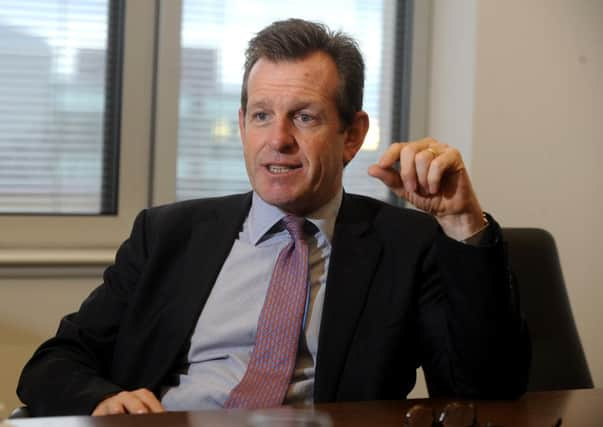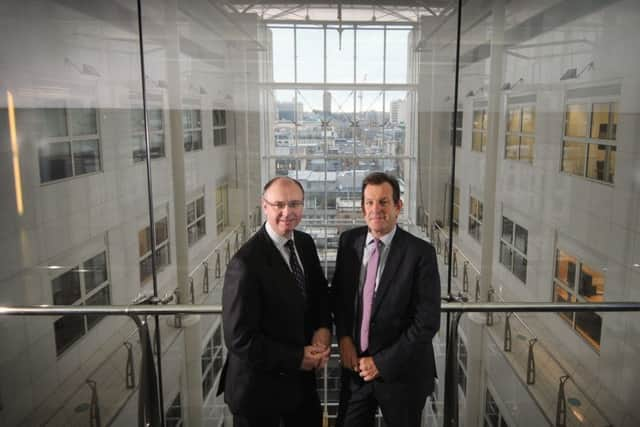Deloitte eyes UK regions for jobs growth away from costly London


Nick Owen, the UK chairman, said he believes that regional offices will become increasingly attractive to young people with talent.
This would mark a reverse of the trend that has seen the brightest and best graduates drawn to London after university.
Advertisement
Hide AdAdvertisement
Hide AdMr Owen said that within a decade, more than half of the firm’s employees will be based outside of London.


Deloitte has around 16,000 employees in the UK, adding around 6,000 over the last dozen years.
Mr Owen predicted a similar or greater level of growth in the coming years.
Deloitte surveyed the attitudes of Millennials and identified the importance of place to the generation of people born between the early 80s and early 00s.
Advertisement
Hide AdAdvertisement
Hide AdSpeaking during a visit to the region, Mr Owen told The Yorkshire Post: “That is not necessarily about geography. It is about what else in that geography.


“My view is that our regional business will become net-net more attractive for the talent in our business over time than less.”
He said a new manager’s disposable income would go a lot further in a city like Leeds than it could in London.
Mr Owen added: “We have noticed in the last two or three years, the challenge not just for the people we want to bring into the business at new graduate level but also for them with their dependents, the cost of the South East has become prohibitive.
Advertisement
Hide AdAdvertisement
Hide Ad“Especially when they might spend their time working somewhere else because the clients have got their operations outside the M25. Even quite a large proportion of our people who work in London actually live outside London so it won’t take a lot to flip the model.”
Martin Jenkins, senior partner of Deloitte in Yorkshire and the North East, said there is hard evidence of the firm’s thinking.
He added: “We have just taken some important decisions around real estate in London.
“We are not planning for significant increases in our headcount in London. We are planning for significant growth in our business.”
Advertisement
Hide AdAdvertisement
Hide AdMr Owen said Deloitte is expecting a large amount of headcount growth in the next decade, but is not planning to put them all in London.
He added: “We are going to limit the amount of space we have in London to stop in becoming a de facto and being much more deliberate about the type of jobs we want to create in centres of excellence outside.”
Deloitte opened a new financial services centre in Glasgow and is planning to create 500 new jobs in Cardiff at a compliance and risk management centre. Mr Owen said: “We will continue to look for more of those.”
Deloitte also has an accounts preparation centre in Newcastle with 50 staff. Mr Jenkins said this will treble over the next two years.
Advertisement
Hide AdAdvertisement
Hide AdProperty consultants at JLL said at an event in Yorkshire earlier this week that London companies are worried about losing staff when they reach their 30s and want to start families, which will create an opportunity for the big three cities of Leeds, Manchester and Birmingham.
Mr Owen said he is aware of many businesses looking to move people around the country.
Mr Jenkins said: “The other significant factor is technology and agile working. That is playing an ever increasing part in how our people do their work, collaborate with colleagues, collaborate with clients.
“We are on a journey of completely shifting a mentality where people have to be in an office to do what they do.”
Advertisement
Hide AdAdvertisement
Hide AdMr Owen was in Yorkshire to speak to staff and meet clients including Aviva, the FTSE 100 insurer.
In-campaign lacks ‘emotional appeal’
The campaign to keep Britain in the European Union suffers from a lack of emotional appeal, the UK chairman of Deloitte has said.
Nick Owen said supporters of the single market believe the best way to reform the trading bloc is from within.
He told The Yorkshire Post: “The challenge with all of these debates is that arguing with something that is broadly a continuation of what has been there before, with a dial up or dial down on certain aspects, it is quite hard to make as emotionally appealing as something radically different.
Advertisement
Hide AdAdvertisement
Hide Ad“We saw that in the Scottish referendum where one set of arguments being put across on logical and analytical grounds and there was another set of arguments which were much more emotionally charged. It is quite hard to compare the two.”
Mr Owen said most people would vote according to their feelings about jobs, migration, way of life and whether they wanted to be part of a bigger or smaller entity.
He added: “Over history, there has always been a fair amount of volatility in terms of UK public opinion but it has largely been the majority for in Europe, not out of Europe. It has taken a dip in the last six weeks to three months.”
In the event of Britain’s exit from the EU, he said: “Even if as some people would argue that in the long run it won’t make much of a difference, the journey to get from where we are today to where we will be in that long run state is going to be quite a perilous one. There is a lot of uncertainty.
Advertisement
Hide AdAdvertisement
Hide Ad“One of the worst things for business is uncertainty because it causes people to be cautious about making decisions and committing capital.
“There is a lot of uncertainty in the world already, whether it be geopolitical or economic and two years of not quite knowing how we would trade with the rest of Europe would be quite a big uncertainty for most businesses.”